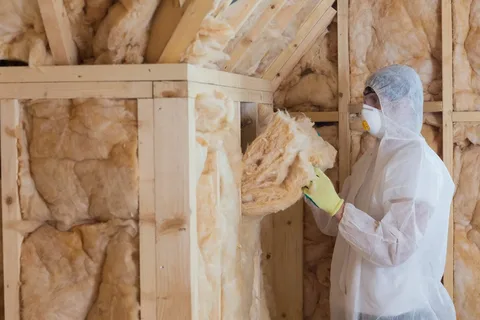Insulation plays a critical role in managing the energy efficiency of your home. In regions like Daviess County, KY where temperatures fluctuate significantly between hot summers and cold winters, the quality of insulation can dramatically impact your energy bills. Whether you are building a new home or evaluating your current property’s insulation, understanding how insulation affects your energy usage is key to keeping those monthly costs in check.
In this blog post, we’ll dive into how insulation works, why it’s so essential for homeowners in Daviess County, KY and the warning signs that might indicate you need better insulation to reduce your energy bills.
Why Insulation Matters for Your Energy Bills
Insulation: The Barrier Between You and Rising Energy Costs
Insulation acts as a barrier that slows down the transfer of heat between the inside and outside of your home. During the winter, it prevents warm air from escaping, keeping your heating system from overworking. In the summer, insulation keeps the cool air from your air conditioner inside, so your home stays comfortable without needing to run the system constantly.
When your home lacks proper insulation or the insulation is outdated, it can’t effectively slow down heat transfer. This forces your HVAC system to work harder to maintain a stable temperature, resulting in higher energy bills.
How Heat Transfer Affects Your Home
Heat moves in three ways: conduction, convection, and radiation. Insulation is designed to reduce heat transfer in all three ways by creating a resistant barrier between conditioned indoor air and the outside environment. This is especially important in areas like Western Kentucky, where seasonal temperature changes can lead to increased energy demands.
- Conduction: Heat transfers through solid materials (such as walls).
- Convection: Heat moves through the air, particularly through drafts or open spaces.
- Radiation: Heat is transferred through waves, like sunlight heating your roof.
By choosing the right insulation material and ensuring it is properly installed, you can minimize this heat transfer and keep your energy bills as low as possible.
How Insulation Works in Different Parts of the Home
Attic Insulation: The Most Critical Area
Your attic is one of the most important areas for insulation. Heat naturally rises, which means in the winter, warm air will escape through your attic if it isn’t well insulated. Similarly, during the hot summer months, the attic can become a heat trap that radiates warmth into the rest of your home.
If you live in Daviess County, KY, you may notice a significant difference in your energy bills just by improving attic insulation. Insulating this space can reduce heat gain in summer and heat loss in winter, helping to maintain a comfortable indoor temperature without overworking your HVAC system.
Wall Insulation: Reducing Heat Loss
Walls are the largest surface area in your home, and if they are not properly insulated, they can let heat escape or seep in, forcing your heating or cooling systems to run more frequently. Homes in Southern Illinois and Northwestern Tennessee, which experience both warm summers and cold winters, need well-insulated walls to maintain energy efficiency year-round.
Modern insulation materials like blown-in cellulose or spray foam offer better efficiency compared to older materials like fiberglass batts. These materials fill wall cavities more completely, leaving fewer gaps for heat to escape.
Floor Insulation: Preventing Drafts and Energy Loss
While walls and attics get most of the attention, don’t forget about your floors. Homes with uninsulated crawl spaces or basements often lose heat through the floors. Cold floors in the winter can make your home feel uncomfortable, requiring more energy to heat. Floor insulation can make a big difference, particularly for homes in Southeast Missouri, where winter drafts can increase energy usage.
Signs That Your Home Needs Better Insulation
1. Increasing Energy Bills
One of the clearest signs that your home may need better insulation is a sudden or gradual increase in your energy bills, especially when there’s no significant change in your energy usage habits. When insulation degrades or is insufficient, your HVAC system will work harder to keep your home comfortable, leading to higher energy costs.
2. Uneven Temperatures Between Rooms
If some rooms in your house feel warmer or cooler than others, it could be a sign of inadequate or deteriorating insulation. In homes with poor insulation, certain areas can become drafty or overly warm because the insulation is no longer preventing heat transfer effectively.
3. Drafts Around Windows and Doors
If you feel drafts near windows, doors, or baseboards, it could indicate that the insulation in those areas has thinned or settled. Drafts are not only uncomfortable, but they also force your heating and cooling systems to work harder, resulting in higher bills.
4. Hot or Cold Attic
If your attic is extremely hot in the summer or cold in the winter, it’s likely that the insulation in this area is insufficient. Because the attic is often a source of heat loss or gain, improper insulation here can cause your HVAC system to run more frequently, driving up energy costs.
5. Ice Dams on Your Roof
In the winter, you might notice icicles or ice dams forming on your roof. This can happen when heat escapes through your attic and melts snow on your roof. As the melted snow refreezes, it forms ice dams, which can damage your roof and gutters. Proper insulation can help prevent this issue by keeping warm air inside your home.
Benefits of Upgrading Your Home’s Insulation
Lower Energy Bills
Upgrading your insulation can lead to immediate savings on your energy bills. By reducing the workload on your HVAC system, you’ll notice a decrease in energy consumption, especially during the peak winter and summer months.
Enhanced Comfort
New insulation will help maintain a consistent indoor temperature, making your home more comfortable year-round. No more hot or cold spots, drafts, or uncomfortable fluctuations.
Better Air Quality
Insulation also helps reduce the amount of dust, allergens, and pollutants that enter your home. This leads to better indoor air quality, which is particularly important for households with pets, allergies, or respiratory concerns.
Increased Home Value
Energy-efficient homes are more attractive to potential buyers. Upgrading your insulation is an investment that can boost your home’s value while providing immediate benefits in terms of lower energy costs and increased comfort.
Frequently Asked Questions (FAQs)
Q1: How often should insulation be replaced?
Insulation can last anywhere from 15 to 30 years, depending on the material and environmental factors. However, if you notice rising energy bills, drafts, or uneven temperatures, it may be time to replace or upgrade your insulation.
Q2: What is the most effective insulation for energy savings?
Spray foam insulation is considered one of the most effective options for reducing energy loss because it expands to fill gaps, creating an airtight seal. However, fiberglass and cellulose are also excellent choices depending on your home’s specific needs.
Q3: Can adding insulation really lower my energy bills?
Yes, upgrading your insulation can significantly lower your energy bills by reducing heat loss in winter and heat gain in summer. This means your HVAC system won’t have to work as hard to keep your home comfortable, leading to savings on your monthly utility bills.
Q4: Can I install insulation myself, or should I hire a professional?
While some homeowners may choose to install insulation themselves, it’s generally best to hire a professional. A trained insulation contractor will ensure that the insulation is installed correctly and meets local building codes, maximizing energy savings.
Conclusion
Insulation plays a vital role in maintaining your home’s energy efficiency and comfort. If you’ve noticed rising energy bills, drafts, or uneven temperatures, it may be time to assess your home’s insulation. For residents in Daviess County, KY as well as Western Kentucky, Northwestern Tennessee, Southern Illinois, and Southeast Missouri, proper insulation can make a big difference in your energy bills.
If you’re ready to take control of your energy costs, Armored Insulation is here to help. Contact them at (270) 727-5566 to schedule a consultation and find out how upgrading your home’s insulation can save you money year-round.





